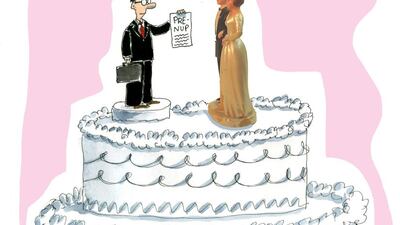My friend married a great guy. I knew that. But something I found out recently makes him even more remarkable. Why? Because it turns out that he had refused to get married unless she went to see a reputable lawyer to discuss how best to protect herself - financially - when married.
Run that by me again?
He, the husband to be, was/is very successful. He had all the trappings of being top dog, and all the baggage: he was divorced and had children. She is well over a decade younger than him, nowhere near his level of financial success, loved him to bits, and didn't care one bit about his money.
He was concerned about the age gap. She was thinking of ways to allay his fears - including the unspoken thought that she was sure others had: that she was in it for the money. So she suggested they sign a prenuptial agreement. One that protects his wealth and gives her nothing.
But he turned it on its head. He said: "yes, that's a great idea." Then he went on to say that he would not marry her until she saw the best lawyer in town to find out how the prenup should be drawn up to protect her and her interests, and what they should do in their marriage to keep her financially safe.
Wowzer. Have you ever heard of such a thing?
So off the bride-to-be went, and listened to what the lawyer had to say.
The plan was for her not to work, which meant that she would have no money coming in. The lawyer's sage advice included that she be given a set amount of cash every month - a salary, if you will - to do with as she wished.
She could have invested it, or given it away. It was totally separate to any house or marriage-related expense.
The fact that she chose to spend it on a good time for her and her friends could be read as her resolute faith in the character of her husband - the reason she married him was that, as well as loving him very much, she felt very deeply that she could trust him with the rest of her life, as she puts it. Or as folly - after all, no one knows what the future holds.
Decades down the line, I'm happy to say that they are still happily married and going strong. They don't know where the prenup is and the monthly "salary" stopped being paid a long time ago as their fortunes further intertwined: they set up businesses both separately and together, and have had financial ups and downs - including at one time having to take out credit cards to be able to pay off existing debt and literally survive hand to mouth.
At the core of their relationship is total blind trust.
The only thing that can "buy" that is behaviour. The fact that they drew up the legal paperwork in itself meant that the chance of it being implemented was dramatically reduced - why? Because they addressed very sensitive, emotional and non-romantic but important issues head-on, and in so doing they were laying the best foundation for their marriage.
The word "prenuptial" agreement doesn't scream romance - but it could be key to keep it going.
How about changing it to Letamor or a "Let's talk about money, ownership and responsibility" agreement. Sounds far less adversarial don't you think? And along with that, let's train ourselves to think of it as a literal "let (there be) amour" or helping "let amour live longer".
Again, a prenup does not mean there is no trust. It's not about securing what you already have - unless that's what you both want. It means that you are going into a serious commitment having addressed and thought through your life together - as best as you can.
Marriage is serious business. Let's do everything we can to stack the odds in favour of it lasting - where everyone feels valued and respected as well as trusted and loved.
Nima Abu Wardeh is the founder of the personal finance website cashy.me. You can reach her at nima@cashy.me.
Follow The National's Business section on Twitter

Mutual financial trust adds up to a happy marriage
Signing a prenuptial agreement before marriage may not be romantic but it may be key to helping that romance last, writes Nima Abu Wardeh.
Most popular today
